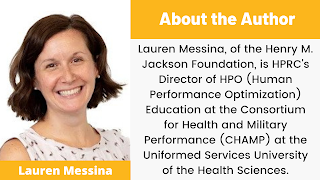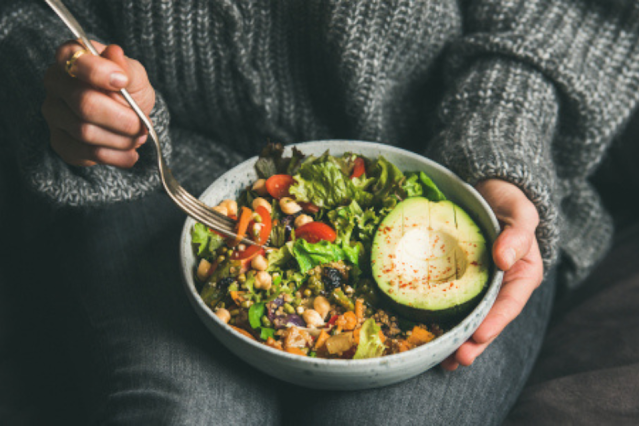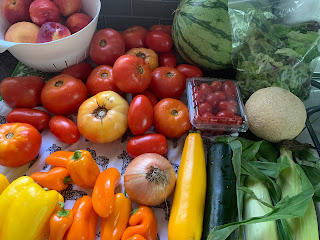By: Lauren Messina, PhD, LCMFT
Growing up in an Italian-American
family in New York, food meant many things. Cooking and eating meals together
was a way to show love and share time. Holidays were 15–30 people deep with a
full 3 courses and no less than 4 types of cakes served at dessert. We
constantly gathered around the table to eat, or “MANGIA!” and talk, laugh, cry,
and just be together.
We talked about the food too—the flavors,
the textures, how delicious it all looked, and what tasted good or bad. What we
never really talked about though was how healthy the meals were (or weren’t),
how the food affected our bodies, or how much we should really eat. We just ate
up!
I attribute my deep appreciation for
food to this upbringing. I really enjoy eating. I like trying new foods, new
flavors, new spices. A new restaurant is a fun adventure. Traveling abroad is a
culinary journey, and I say “bring it on.”
Around the same time as I was thinking
more about my family’s medical history, I moved 4 hours away from home. For the
first time, I was solely responsible for feeding myself—no college cafeteria to
fall back on or Mom and Dad’s refrigerator to look through. It was a chance for
me to think about my food choices. Was
I eating something just because I always had? Because someone at one point told
me I should? Because the brand was familiar and comforting? Because eating it
actually made me healthier?
I had always been a somewhat picky
eater. As a kid, learning where meat came from, I refused to eat anything “with
a face” for a while. I even went through a period of taking all the cheese and
tomato sauce off pizza and being grossed out by tomato seeds.
As I thought more about my family’s
health history and why I chose to eat in certain ways, I realized I had many more
options to explore. I had just started graduate school at the University of
Maryland School of Public Health and was learning more about the connections
between our food system and public health problems in the U.S.
I learned that not only did my food
choices affect my health, they also affected the environment. I learned more
about the U.S. food system and how food gets into grocery stores, restaurants,
and onto our plates. I thought about the implications of this system—both for the
people who work within it and for the physical environment, the Earth. And I
realized some of my food-buying choices contributed to problems like climate
change.
These topics were never part of our
family dinner conversations. We never talked about where our food actually came
from, what it took to get to our plates, the results of that chain, or how it
was helping or hurting the people involved.
I was also alarmed to learn the meat I
ate might have chemicals and hormones in it that could hurt my health. And I
realized that without someone cooking the meat for me, I wasn’t very inclined
to eat it. I wanted to prioritize my health and take steps to prevent diseases
some of my family members might have avoided if they had paid more attention to
their eating habits. I wanted to be proactive about how I ate. So I decided to
stop eating meat.
In January 2009, I became a vegetarian.
Even after all these years, it still sounds funny to make that declaration. Usually
I just say, “I don’t eat meat or fish.”
This life decision was initially met with some confusion by my family and an expectation it was just a passing phase. Yet I saw switching to a vegetarian diet as an opportunity to bring more awareness to what I ate and how those foods affected me physically and mentally. It was a chance to make more careful decisions about the food I bought, where it came from, and whether it came from places that didn’t hurt the environment or the people involved in producing it. And it was a chance to make daily decisions to prioritize my health, hopefully ward off the chronic diseases that run in my family, and optimize who I am from the inside out.
Here are 5 lessons I learned about my relationship with food in my journey to becoming a vegetarian:
- The decisions you make on a regular basis have implications for your health and the health of the systems around you. You get a say in what you put into your body, and you have some purchasing power about how and where you choose to spend your money. Exercise that power consciously and in a way that’s aligned with your values.
- Every body is different. Listen to your own. Get in touch with how eating certain foods makes you feel. Eat with awareness and reflect on how your body reacts to that food.
- Eat the rainbow. Color is key when eating with the goal of being healthier. Not eating meat doesn’t mean you just eat bread and cheese. Challenge yourself to get as many colors into your dish as possible each day.
- Expand your horizons and try something new. There are plenty of plant-based protein options and plant “super foods” that can keep you full and fueled. Be willing to try things you might have had little exposure to, such as quinoa, tofu, tempeh, and seaweed. Try nuts and seeds too—chia seeds, sunflower seeds, pumpkin seeds. Try some of these plant-forward eating ideas.
- Question your beliefs about food. Just because you grew up eating one way or certain types of foods doesn’t mean you’re locked into that pattern for life. Reflection is core to self-growth. It’s okay to ask, “Is this working for me now? Is there a better way for me moving forward?”
Being a vegetarian works for me. I don’t miss meat or crave it. I’m fairly certain I’ll continue to not eat meat as I get older, but I’ll keep listening to my body, and if things change, I’ll reassess. Overall, I’ll continue to make decisions to put food into my body I feel good about, that I know where it came from, and what it took to get to my plate. I know what fuels me well and I’ve learned when enough food is enough. Even with my plant-based focus, I can still “MANGIA!” with the best of them.








